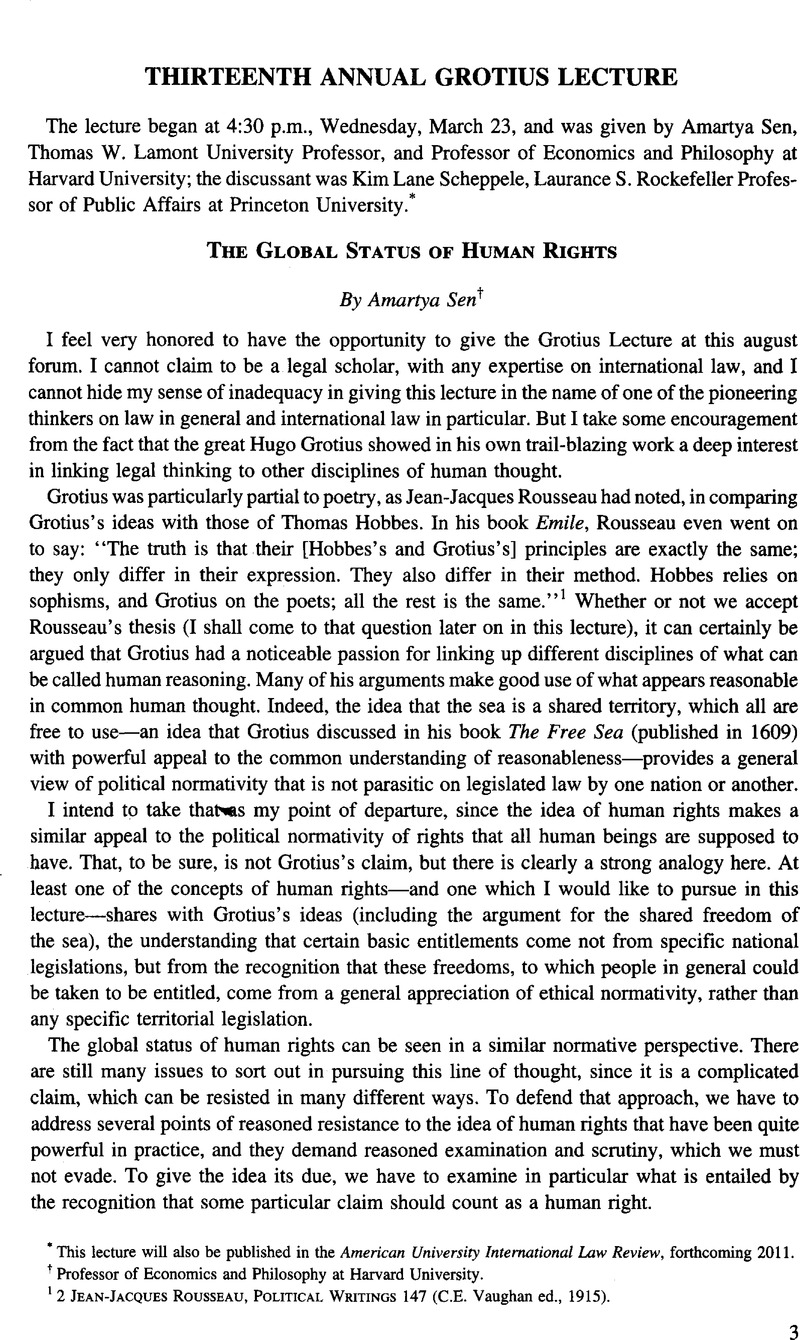Article contents
The Global Status of Human Rights
Published online by Cambridge University Press: 28 February 2017
Abstract

- Type
- Thirteenth Annual Grotius Lecture
- Information
- Copyright
- Copyright © American Society of International Law 2011
References
1 2 Rousseau, Jean-Jacques, Political Writings 147 (Vaughan, C.E. ed., 1915)Google Scholar.
2 I have tried to explore this and related issues in my essay, Elements of a Theory of Human Rights, 32 Phil. & Pub. Aff. 315 (2004)Google Scholar, and also in my last book, The Idea of Justice (Harvard University Press, 2009 Google Scholar), particularly in Chapter 17.
3 There is a clear analogy here with Grotius’s motivational discussion of the freedom of the sea, including his early articulations on the rights of all on the high seas, which came in the context of the Dutch seizure of the Portuguese ship Santa Catarina in 1603. That motivational analysis would lead later to Grotius’s pioneering formulation of the theory of international law, including the particular enunciation of legitimacy in The Free Sea (1609).
4 Bentham, Jeremy, Anarchical Fallacies; Being An Examination of the Declaration of Rights Issued During the French Revolution 501 (Bowring, J. ed., The Works of Jeremy Bentham, vol. II, 1843) (1792)Google Scholar.
5 Id. at 523.
6 Paine, Thomas, The Rights of Man: Being an Answer to Mr. Burke’s Attack on the French Revolution (London: Dent; New York: Dutton, 1906) (1791)Google Scholar; Wollstonecraft, Mary, A Vindication of the Rights of Woman (London: Dent; New York: Dutton, 1929) (1792).Google Scholar
7 Hart, H.L.A., Are there Any Natural Rights?, 64 Phil. Rev. 175 (1955)CrossRefGoogle Scholar, reprinted in Theories of Rights 79 (Jeremy Waldron eds., 1984).
8 Tasioulas, John, The Moral Reality of Human Rights, in Freedom From Poverty as A Human Right: Who Owes What to the Very Poor? 76 (Pogge, Thomas ed., 2007 Google Scholar).
9 The huge social importance of woman’s participation in family decisions is discussed in Chapter 8 (“Women’s Agency and Social Change”) of my book, Development as Freedom (Alfred A. Knopf, 1999).
10 Kant, Immanuel, Critique of Practical Reason (Beck, L.W. trans., Bobbs-Merrill 1956) (1788 Google Scholar).
11 See Elements of A Theory of Human Rights (2004); the Idea of Justice, ch. 17 (2009).
12 On this, see Ashworth, Andrew & Steiner, Eva, Criminal Omissions and Public Duties: The French Experience, 10 Legal Stud. 153 (1990)CrossRefGoogle Scholar; Williams, Glanville, Criminal Omissions: The Conventional View, 107 L.Q. Rev. 86 (1991)Google Scholar.
13 Aristotle, , Nichomachean Ethics 3 (Ross, Willliam David trans., Oxford Univ. Press ed. 1998 Google Scholar).
14 The role of public reasoning in the acceptability of ethical propositions, including ideas of justice, is part of the subject matter of my book, The Idea of Justice (2009).
15 John Rawls, A Theory of Justice (1971); Political Liberalism (1993).
16 See John Rawls, the Law of Peoples (1999).
17 Smith, Adam, The Theory of Moral Sentiments (republished in an anniversary edition, Hanley, Brian ed., Penguin 2009 Google Scholar, with an introduction by myself) (1759); Lectures on Jurisprudence (R.L. Meek, D.D. Raphael & P.G. Stein eds., Clarendon Press 1976) (1762).
18 Smith, Lectures on Jurisprudence, supra note 16, at 104.
19 3 Smith, Adam, The Theory of Moral Sentiments 110 (Clarendon Press 1976) (1759)Google Scholar. I pursue the Smithian perspective on moral reasoning in my article, Open and Closed Impartiality, 99 J. Phil. 445 (2002)Google Scholar.
- 3
- Cited by


